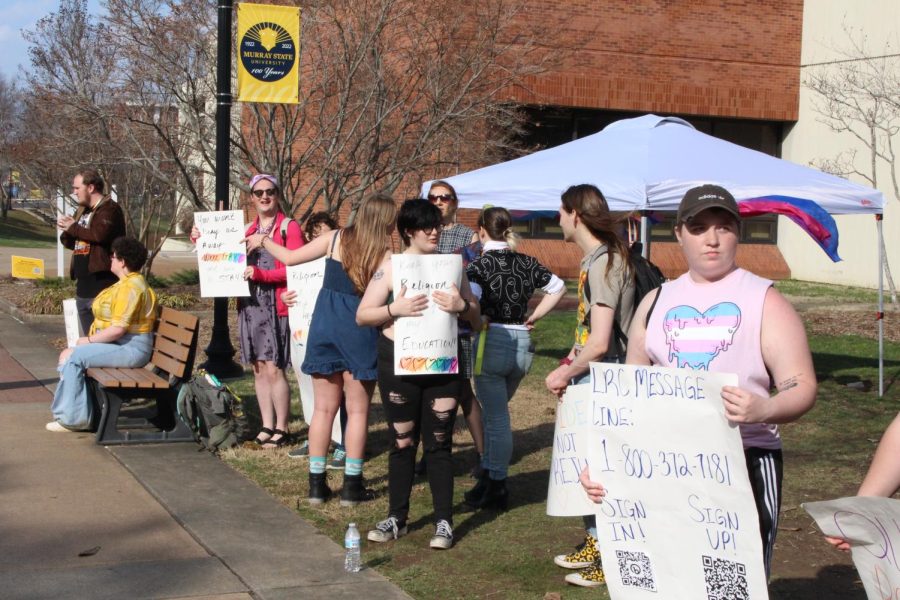Legislators override anti-trans bill veto
Students protested Senate Bill 150 and other anti-LGBTQ bills like it on Feb. 23. (Dionte Berry/The News)
April 6, 2023
Kentucky’s Republican supermajority overrode Gov. Andy Beshear’s veto of Senate Bill 150 on March 29, which most notably bans transgender health care such as surgery, hormone replacement therapy and puberty blockers for minors in the state.
If minors are already undergoing hormone therapy, doctors are required to detransition their patients once the bill takes effect in June.
Along with setting restrictions on classroom discussions about sexual orientation and gender identity, SB 150 allows teachers to refrain from using students’ pronouns and requires students use restrooms for their gender assigned at birth. Students may request “acceptable accommodations,” including single-stall restrooms, with parental permission.
On the morning of March 29, hundreds of teenagers gathered on the Kentucky Capitol lawn to protest the bill. Police also escorted protestors out of the House chamber.
The bill passed the veto override with a 29-8 vote in the Senate and a 76-23 vote in the House with a near party-line vote. Sen. Danny Carroll, R-Benton, was the only Republican in either chamber to vote against the override.
Attorney General Daniel Cameron praised the bill for “protect[ing] our youth from irreversible procedures.”
“Beshear vetoed this bill because he is beholden to the far left,” Cameron said. “I stand ready to defend this law and protect the well-being of our most precious resource, our children.”
Others, including Sen. Gary Boswell, R-Owensboro, echoed Cameron, saying the bill protects Kentucky’s children.
“I have eight granddaughters,” Boswell said on the Senate floor. “Who here could support a man going into my granddaughter’s bathroom?
The bill faced staunch opposition from Democrats, including Sen. Karen Berg, D-Louisville. Berg, who lost her transgender son to suicide last year, said the claim the bill protects children is “completely disingenuous.”
“This is an absolute willful, intentional hate for a small group of people that are the weakest and the most vulnerable among us,” Berg said to her colleagues. “What was your purpose in choosing to serve? Because if it was to help the least among us, you are failing miserably.”
Abigail Cox, director of the Pride Center, said her position has allowed her the opportunity to interact with many trans students.
“These amazing people are beginning to consider whether or not they can pursue their goals and ambitions in a state that does not value who they are and what they have to offer,” Cox said. “These legislative actions take an emotional and mental toll on the people they directly impact, the people that care about them and the communities they belong to.”
Cox said she hopes the Pride Center improves these students’ experiences.
“The Pride Center is committed to providing support and inclusion for our students,” Cox said. “We are committed to demonstrating how much we value their authenticity, and we are committed to voicing their concerns and needs to decision-makers.”
According to the American Civil Liberties Union (ACLU) of Kentucky, the bill represents an assault on the state’s LGBTQ youth.
“Trans Kentuckians, medical and mental health professionals and accredited professional associations pleaded with lawmakers to listen to the experts, not harmful rhetoric based in fear and hate,” the ACLU said in a statement. “Their pleas fell on deaf ears as the General Assembly passed the bill in a matter of hours.”
In the same statement, the ACLU announced their plan to sue over SB 150.
“To all the trans youth who may be affected by this legislation: we stand by you and we will not stop fighting,” the statement read. “You are cherished. You are loved. You belong. To the commonwealth: we will see you in court.”
achuppe@murraystate.edu



























































































